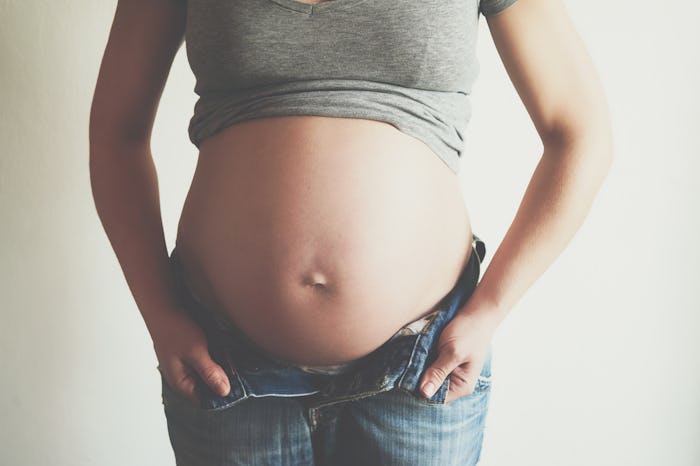Life

6 Factors That Increase The Risk Of A Heart Attack During Pregnancy, According To Experts
Pregnancy puts a lot of added stress on the body. Not only are you dealing with the usual aches and pains associated with growing another human being inside your body, but certain factors during pregnancy can increase your risk of experiencing other health problems. For example, even if you don't have a history of heart problems, there are things that increase the risk of a heart attack during pregnancy that every expecting mom should be made aware of.
Cardiologist Dr. Suresh Sharma tells Romper via email that there's a definitive gender gap when it comes to diagnosing a heart attack between men and women. This is especially true when comparing pregnant women and non-pregnant women, because the signs of a heart attack may differ. Two separate surveys, and an additional 150 new cases of heart attacks associated with pregnancy, found that otherwise healthy pregnant women who suffered a heart attack "didn't present with traditional cardiovascular risk factors, such as high blood pressure, diabetes or high cholesterol levels."
The American College of Cardiology states that, due to the "dramatic shift in hormones" and increase in blood volume pumped through the body during pregnancy, a woman's risk for heart attack increases seven percent — two to three times higher than non-pregnant women. According to the Mayo Clinic, blood volume levels increase by 30 to 50 percent during pregnancy, to ensure the fetus receives the nutrients it needs to grow. As a result, the heart pumps faster and a pregnant person's heart rate increases.
Don't let the aforementioned numbers frighten you, though. While a pregnant woman is at a greater risk for a heart attack than a non-pregnant woman, a heart attack only happens in 1 out of every 16,000 deliveries. Diagnosing any potential problems is critical, and so is knowing the factors that might increase your risk of having a heart attack during pregnancy, including the following:
Preeclampsia
Hopkins Medicine defines preeclampsia as "pregnancy-induced high blood pressure, along with protein in the urine." It's the precursor to eclampsia which can lead to coma, seizures, or death. The risk of having a heart attack during or immediately after pregnancy is increased when there's a history of preeclampsia because the disease raises a person's blood pressure, which adds an additional level of stress to the heart.
Preeclampsia.org states that the condition affects 1 in 12 pregnancies, leaving you twice as likely to have a stroke, twice as likely to develop heart disease, and four times as likely of having high blood pressure. If that's not terrifying enough, two out of three women who've had preeclampsia will die from a cardiovascular disease. If you've been diagnosed, it's important to have an action plan with your provider, such as monitoring heart health and blood vessels throughout the pregnancy.
Gestational Diabetes
Though gestational diabetes generally vanishes once the baby is born, there's an increased risk the mom will develop diabetes later on in life. A 20-year study of 898 women, ages 18 to 30, found that having a history of gestational diabetes increases a woman's chances of sub-clinical atherosclerosis, type 2 diabetes, and metabolic syndrome, according to Erica P. Gunderson, Ph.D., M.S., M.P.H., study lead author and senior research scientist involved with the study.
So even if you're diagnosed with gestational diabetes during pregnancy and that diagnosis disappears postpartum, you're still at risk for a heart attack.
Narrowing Of Arteries
According to St. David's Women's Center of Texas, "the carotid arteries are major arteries found on each side of the neck. They supply blood from the heart to the brain." While there are a slew of factors that can cause a heart attack — such as a family history of atherosclerosis, coronary artery disease, fatty build-up, high blood pressure, smoking, diabetes, obesity, or high cholesterol — the chances of having a heart attack are increased as your body works harder to pump blood through smaller vessels. The restriction of blood flow can result in chest pain, like angina, or a heart attack.
Coronary Dissection
One of the more common heart-related issues pregnant women face, according to Science Daily, is a coronary dissection — "a separation of the layers of the artery wall that blocks normal blood flow." It's actually less common, rare actually, in non-pregnant people, making it something to watch out for during pregnancy.
Heart Rythym Issues
It's OK to have minor abnormalities in heart rhythm during pregnancy because, again, there's added stress on your heart. But if your doctor confirms that there's an arrhythmia, you'll likely be prescribed medication. If it worsens, or becomes highly irregular, other tests may be performed to rule out your risk of a heart attack.
Congestive Heart Failure Or Defect
Heart failure happens when the blood volume is too high. If you develop a condition that weakens your heart muscles, or the heart becomes enlarged, the blood your body needs can't travel through the body. The result can be fatal. As always talk to your doctor if you have any out-of-the ordinary symptoms to be sure your heart isn't at risk.